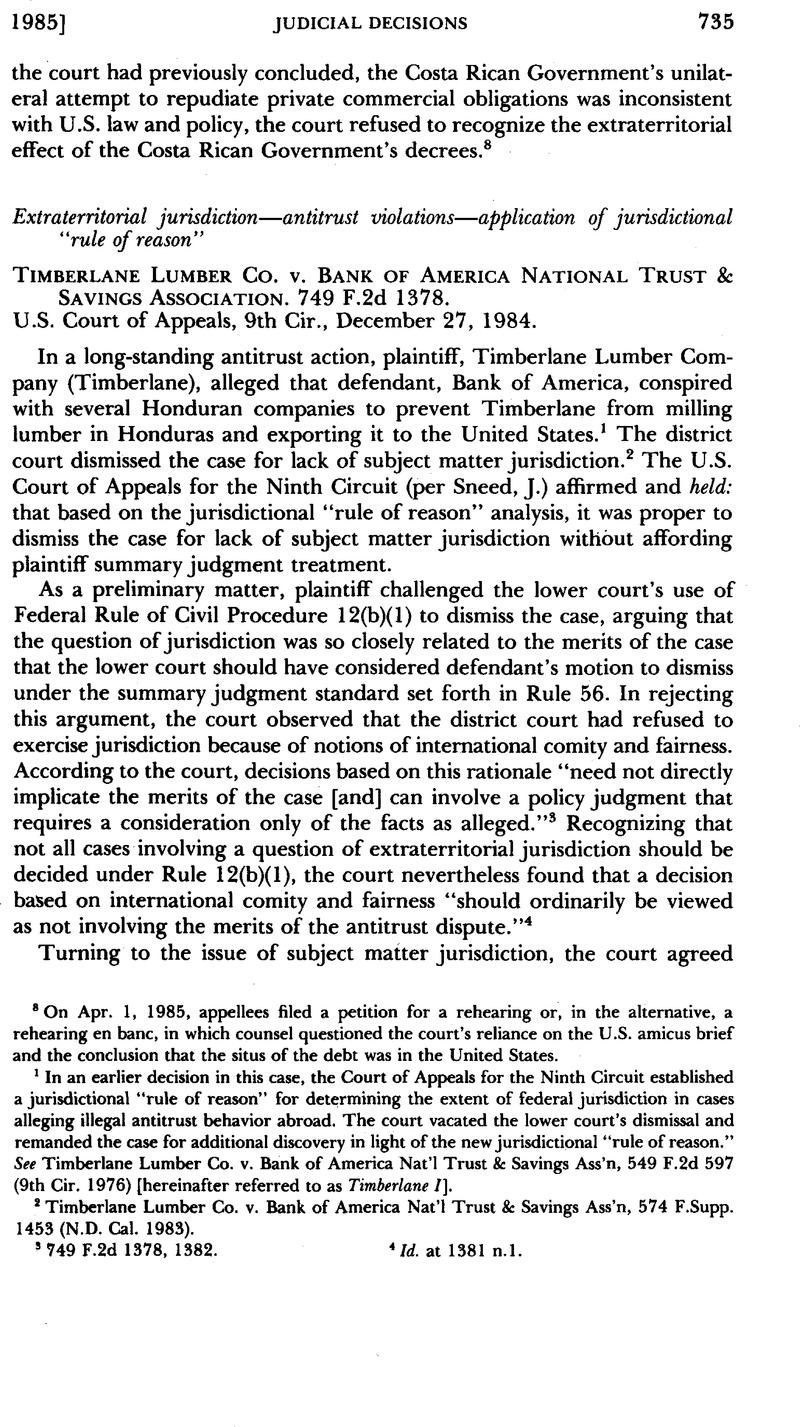No CrossRef data available.
Article contents
Timberlane Lumber Co. v. Bank of America National Trust & Savings Association. 749 F.2d 1378
Published online by Cambridge University Press: 27 February 2017
Abstract

- Type
- Judicial Decisions
- Information
- Copyright
- Copyright © American Society of International Law 1985
References
1 In an earlier decision in this case, the Court of Appeals for the Ninth Circuit established a jurisdictional “rule of reason” for determining the extent of federal jurisdiction in cases alleging illegal antitrust behavior abroad. The court vacated the lower court’s dismissal and remanded the case for additional discovery in light of the new jurisdictional “rule of reason.” See Timberlane Lumber Co. v. Bank of America Nat’l Trust & Savings Ass’n, 549 F.2d 597 (9th Cir. 1976) [hereinafter referred to as Timberlane I].
2 Timberlane Lumber Co. v. Bank of America Nat’l Trust & Savings Ass’n, 574 F.Supp. 1453 (N.D. Cal. 1983).
3 749 F.2d 1378, 1382.
4 Id. at 1381 n.1.
5 See note 1 supra.
6 749 F.2d at 1383 (quoting Timberlane I, 549 F.2d at 613) (emphasis in original).
7 749 F.2d at 1383.
8 Id.
9 These factors are (1) the degree of conflict with foreign law or policy; (2) the nationality or allegiance of the parties and the locations of principal places of business of corporations; (3) the extent to which enforcement by either state can be expected to achieve compliance; (4) the relative significance of effects on the United States as compared with those elsewhere; (5) the extent to which there is explicit purpose to harm or affect American commerce; (6) the foreseeability of such effect; and (7) the relative importance to the violations charged of conduct within the United States as compared with conduct abroad.
10 749 F.2d at 1384.
11 Id.
12 See Laker Airways Ltd. v. Sabena, Belgian World Airlines, 731 F.2d 909, 948-53 (D.C. Cir. 1984), summarized in 78 AJIL 666 (1984).
13 Restatement of the Foreign Relations Law of the United States (Revised) §415(2) (Tent. Draft No. 6, 1985) (emphasis added). However, the revised Restatement would also establish that the assertion of U.S. jurisdiction in that circumstance would be “presumptively reasonable.” Id. §415 comment a. Moreover, if a principal purpose of the conduct or agreement is not to interfere with U.S. commerce, jurisdiction may be asserted only if the “agreements or conduct have substantial effect on the commerce of the United States and the exercise of jurisdiction is not unreasonable.” Id. §415(3).
14 Cf. United States v. Aluminum Co. of America, 148 F.2d 416 (2d Cir. 1945) (intention to affect plus effect on U.S. commerce constitutes sufficient basis for U.S. jurisdiction).




